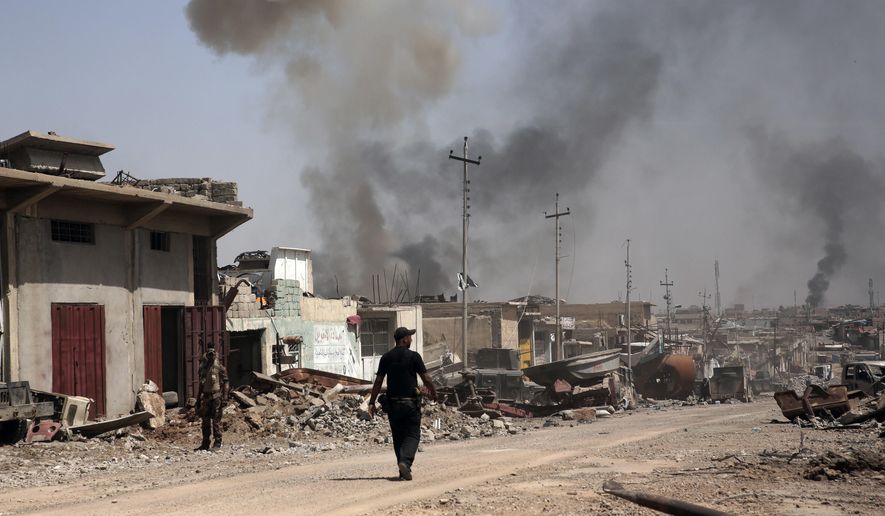BAGHDAD (AP) - While Iraq’s conventional military has been slowly clearing the Islamic State group from inside Mosul’s complex urban terrain, Iraq’s Iran-backed Shiite paramilitary forces have been working their way through less glamorous territory: vast deserts west and south of the city that run along and across Iraq’s border with Syria.
The territory, dotted with small villages and dusty roads, is home to key supply lines into neighboring Syria and connecting Iraq’s north to the capital Baghdad. Control of the Iraqi-Syrian border would be a key strategic prize for the mostly Shiite paramilitary forces and their backer Iran, who also supports the government of Syrian President Bashar Assad.
One division of the Iraqi government-sanctioned paramilitary group known as the Popular Mobilization Forces first reached Iraq’s border with Syria on Monday after securing a string of small villages west of Mosul and south of Sinjar, according to Ahmed al-Asadi, the group’s spokesman.
“This will be the first step to the liberation of the entire border,” he said.
The PMF began Monday’s operation by pushing IS militants out of the center of the town of Baaj, some 40 kilometers (25 miles) from the Syrian border. Once the town was retaken a unit was dispatched to secure the village of Um Jrais along the border.
“This victory will also be an important incentive for the Syrian Arab Army to secure the entire border from the Syrian side,” al-Asadi said, referring the Assad’s government forces.
As the PMF secure more of the border region, they plan to “erect a dirt barricade and dig a trench,” said Sheikh Sami al-Masoudi, a paramilitary group leader. Iraq’s border with Syria has long been a haven for smugglers and insurgent activity.
The Nineveh foothold would give the paramilitary forces considerable leverage politically and militarily in Iraq after the fight against IS is concluded, according to Maria Fantappie, the senior Iraq researcher for the International Crisis Group, a non-governmental research firm.
“The Iranians have been prioritizing something that the U.S. has overlooked: control over strategic roads, rather than control of the Sunni communities,” Fantappie said explaining that the U.S.-led coalition’s fight against IS has largely focused on retaking cities while the PMF have instead focused on transit and supply lines.
Control of roads and borders also allows the paramilitary forces to divide Iraq’s Sunni community geographically and politically, Fantappie said.
“They have been trying to bisect Iraq and prevent a unified Sunni block from emerging,” she said.
More than 150 kilometers (93 miles) away from the PMF’s border advance, Iraqi military and police forces are slowly closing in on the last pockets of IS control in Mosul’s Old City. Iraqi commanders say the grueling fight that is now in its eighth month is in the final stage, an operation that the United Nations warns will likely put the more than 100,000 civilians still trapped by IS inside Mosul at severe risk.
In Syria, Assad’s forces and their allies have also been on the offensive, moving toward the Iraqi and Jordanian border, but are still far from reaching it. U.S.-backed Syrian Democratic Forces, IS militants and Syrian rebels are also fighting for territory in an increasingly messy battle space.
On May 18, a U.S. airstrike hit pro-Syrian government forces that the U.S.-led coalition said posed a threat to American troops and allied rebels operating near the border with Jordan. The attack was the first such close confrontation between America troops and fighters backing Assad.
The Islamic State group traces its roots to the insurgency that grew in Iraq after the 2003 toppling of Saddam Hussein, but the group rose to power under the leadership of Abu Bakr al-Baghdadi in Syria following the 2011 uprising against Assad. In early 2014, IS began driving Iraqi government forces out of the country’s western Anbar province and that summer overran Mosul and large swaths of Iraq’s north. At the height of the group’s power IS controlled nearly a third of Iraq, but with aid, training and weapons from Iran and then the U.S.-led coalition, Iraqi forces have retaken more than half of the land the extremists once held.
After securing the Iraqi side of the border with Syria, Iraq’s Popular Mobilization Forces are ready to move inside Syrian territories to assist Assad, said Hashim al-Mousawi, a leader with the powerful al-Nujaba militia that falls under the PMF umbrella. Before the PMF was sanctioned by the Iraqi government al-Nujaba fighters openly fought inside Syria, helping prop up the Assad regime during the early days of the uprising against his government.
But, now al-Mousawi said crossing into Syria to fight would require the approval of the Iraqi government in Baghdad.
• Associated Press writers Sinan Salaheddin in Baghdad and Bassem Mroue in Beirut contributed to this report.




Please read our comment policy before commenting.